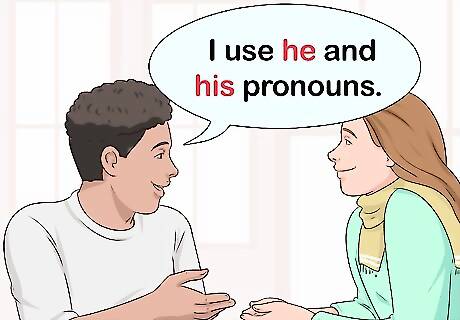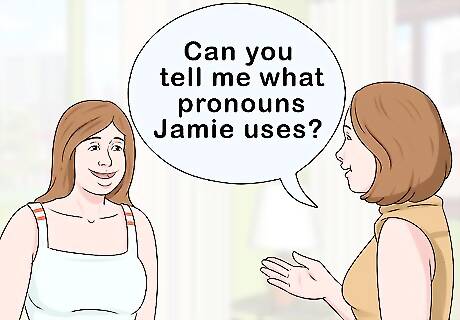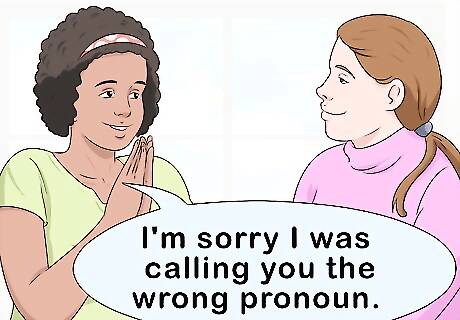
views
- Speak with the person privately and politely ask what their preferred pronouns are.
- Encourage the person to share their pronouns by offering your own first.
- Pay attention to the pronouns other people use when referring to the person, or ask a mutual friend if they know which pronouns to use.
Asking Politely

Ask them calmly in a private conversation. If you must ask someone's pronoun, wait until you are talking only to them. It can endanger people if their pronoun is questioned in public, and others might simply find the attention unwelcome. Ask calmly. If you ask with a lot of nerves, they may feel too awkward to answer. Take a deep breath before you ask. You might begin by saying, "Hey, do you mind if I ask you something?" or "There's something I realized I never asked you."

Lead by telling them your pronouns. Even if people usually guess your gender identity correctly, it's still polite to share your pronouns when you're asking someone else to share theirs. You might say, "I use he/him pronouns. May I ask what you use?" If you have known one another for a while, you might feel awkward asking. Simply apologize for not having asked earlier. You may say, "I realize I never asked for your pronouns. I use she/her. What do you use?" If you suspect a friend's pronoun may have changed, ask them. "Melissa, may I ask if I am using the wrong pronoun for you? I heard Arthur refer to you as "they," and I realize I've always called you "she.""

Ask about pronouns, not gender. Don't ask someone "Are you a guy or girl?" as this is a personal question that not everyone wants to answer. Many people are nonbinary or genderqueer, meaning they don't identify as a man or woman. Instead, ask what words you should use to refer to them. Instead of asking "What is your gender," ask, "What pronouns do you use?"

Ask a mutual acquaintance. It's usually considered acceptable to ask a mutual acquaintance, especially if you know them better than you know the person in question. For instance, if someone introduced you to the person, you can ask them what the person's gender identity is. You might say, "I want to check so that I don't misgender Jamie. Can you tell me what pronouns Jamie uses?"
Figuring it Out

Listen to see how others refer to them. If you have common acquaintances, they'll eventually use the person's pronoun. People who know them well will probably use the correct pronoun. If you hear people using different pronouns, you can ask one of them which is correct in a private moment. Some people do use multiple pronouns, such as "she" and "they," so their friends will not be surprised if you haven't figured it out.

Bring them up in conversation. You can also try asking questions about the person in order to get the other person to use a pronoun. For instance, you might say, "How do you and Jamie know one another?" or "What does Jamie do in this company?"

Notice any cues in how they present themselves. Name, hairstyle, clothing, and body language are all ways people express gender. For instance, if someone has a masculine name, wears masculine clothing, and moves in a masculine manner, they are more likely to use masculine pronouns. This is especially important if you suspect someone may be transgender. If their clothing strongly suggests one gender, and their features do not necessarily correspond, you should trust the clothing over their physical features. Observation is not a failsafe method: gender expression and gender identity aren't always the same! Some people present in an ambiguous manner, and others may express masculinity or femininity without identifying as the corresponding gender.

Look them up online. Many online platforms include information about gender. If there are any articles or other online profiles of someone, they may use pronouns for the person. Adding someone on a social media platform may also be a good way to find out their pronoun.
Best Practices

Don't guess. If someone's gender presentation is ambiguous, it's not your job to assign them a pronoun. Don't just go for "he," "she," or a non-binary pronoun unless you have learned it.

Take your time. There's no need to panic if you can't pin down someone's gender identity the first time you meet them. In the meantime, avoid using gendered language until you do know their gender. You can refer to people by their name instead of saying "he" or "she." Few people are offended by the gender-neutral pronoun "they" if used in situations where you are not certain.

Apologize discretely if you use the wrong pronoun. If you find out you have been using the wrong pronoun, or if you accidentally misgender someone whose gender identity you know, it's polite to apologize. Find a private moment as soon as you can and say that you're sorry. You can say, "I'm sorry I was calling you the wrong pronoun. I should have asked." If you had a slip-up, say, "I want to apologize for using the wrong pronoun back there. There's no excuse. I'll be more mindful in the future." If you use the wrong pronoun in front of a group, correct yourself immediately and apologize briefly. Say, "I mean she, sorry about that."

Avoid giving gender feedback. Even if it's positive, you can hurt someone's feelings (or just annoy them) by commenting on their gender presentation. Avoid evaluating someone's dress, attractiveness, or mannerisms. A lot of transgender people get unsolicited comments on their "naturalness" or "bravery." Try not to assume what they want to look like, or what their experience has been.

Never ask about someone's anatomy. Unless you are dating, you don't have a reason to ask what about someone's physical appearance. If you are curious about whether someone is cisgender or transgender, or what sort of surgeries or treatments they might have had, just let it go. They'll tell you if they want you to know.



















Comments
0 comment